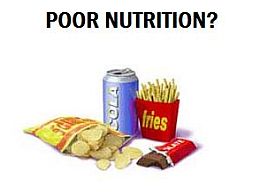The Effects of Poor Nutrition on your Health
 In the United States, approximately 78 million adults aged 20 and above are obese. One major issue with the on-going rise of obesity is poor nutrition and a general lack of health consciousness. Poor nutrition has a significant number of dangerous effects on health. Fortunately, attaining a healthy lifestyle can cause a turn-around of those bad effects and lead to a reduced occurrence of medical disorders related to poor nutrition.
In the United States, approximately 78 million adults aged 20 and above are obese. One major issue with the on-going rise of obesity is poor nutrition and a general lack of health consciousness. Poor nutrition has a significant number of dangerous effects on health. Fortunately, attaining a healthy lifestyle can cause a turn-around of those bad effects and lead to a reduced occurrence of medical disorders related to poor nutrition.
Effects of Poor Nutrition on your Health
Consistently making poor choices when it comes to food can lead to several unhealthy outcomes.
Some of these effects of poor nutrition include:
1. Cardiovascular disease (CVD): High blood cholesterol and lipid build-up can clog arteries, leading to cardiovascular disease. Poor nutrition choices that can lead to CVD include fatty diets, excessive alcohol intake, and smoking.
2. Hypertension: Excessive sodium consumption and insufficient potassium in the diet can cause hypertension. Excessive alcohol consumption can also cause hypertension.
3. Diabetes: Diabetes occurs as a result of a metabolic disorder in the body. It can occur when the body does not make enough insulin to break down glucose (type 1 diabetes), or when the insulin present cannot be used (type 2 diabetes). Type 1 and 2 diabetes both lead to extreme amounts of blood glucose and medical complications. Type 1 diabetes is hereditary, but type 2 diabetes can occur as a result of obesity which is directly related to poor nutrition choices.²
4. Cancer: In addition to genetics, dietary choices can affect the development of some cancers such as prostate cancer in men. Obese individuals are more susceptible to prostate cancer.
5. Osteoporosis: Osteoporosis-related fractures are as a result of inadequate nutrition and lack of physical activity,
6. Problems of being overweight or obese: Poor nutrition can cause individuals to be overweight or obese. Solutions such as decreasing sodium intake and calories from solid fats and added sugars can drastically reduce the occurrence of overweight or obesity health-related issues.
7. Mental Disorders: Poor nutrition can exacerbate certain mental illnesses. What you eat ultimately affects your emotions and proper brain functioning. Foods such as Omega-3 fatty acids affect neural functioning positively. A study done in Norway shows the connection between sugary soft drinks and mental health problems.³
Healthy nutrition can be obtained by maintaining a balanced lifestyle of healthy eating. The Dietary Guidelines for Americans is a document jointly created by the U.S. Department of Agriculture (USDA) and the U.S. Department of Health and Human Services (HHS). It contains recommendations to help Americans maximize the nutritional content of their meals and reduce the effects of poor nutrition. MyPlate is the graphical representation of the Dietary Guidelines for Americans. The major goals of the Dietary Guidelines are to provide pathways to help individuals maintain calorie balance and consume nutrient-dense foods and beverages.¹ Any eating habits outside these recommendations can lead to poor nutrition.
Recommendations for Healthy Nutrition
Some of the recommendations in the guidelines include:
1. Improving eating and physical activity behaviors to balance number of calories.
2. Reducing daily sodium intake to 2,300mg (1,500mg in individuals who are 51 and older, and individuals with some chronic medical conditions).
3. Consuming less than 10% of calories from saturated fatty acids, and also replacing them with monounsaturated and polyunsaturated fatty acids.
4. Consuming less than 300mg of dietary cholesterol.
5. Reducing calories from solid fats and added sugars.
6. Reducing consumption of refined grains.
7. Increasing intake of a variety of vegetables and fruits.
8. Increasing intake of fat-free or low fat milk and milk products.
9. Choosing foods that have more potassium, fiber, calcium, and vitamin D, nutrients of concern in the general American diets.
References:
1. U.S. Department of Agriculture and U.S. Department of Health and Human Services. Dietary Guidelines for Americans, 2010. 7th Edition, Washington, DC: U.S. Government Printing Office, December 2010.
2. National Diabetes Information Clearinghouse. Causes of Diabetes [Internet]. National Institutes of Health (NIH); 2011, Sept (Updated 2011, Dec 5). Available From: http://diabetes.niddk.nih.gov/dm/pubs/causes/#what
3. Regional Research Institute for Human Services. How Diet and Nutrition Affect Mental Health [Internet]. Portland State University. Available From: http://www.pathwaysrtc.pdx.edu/pdf/fpS1205.pdf
-
Advertisement

 Facebook
Facebook  Twitter
Twitter  RSS
RSS







